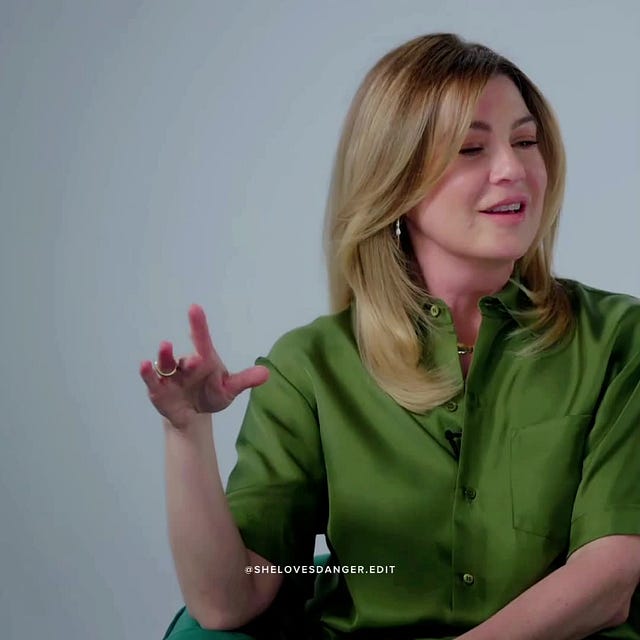Evolution of the "Pick-Me" Girl
The pressure to be chosen and beloved recruits us into behaviours our true heart's desire would never ask from us. Here's how to identify the Pick-Me Girl discourses and what to do instead.
Heart Work is written by an Internal Family Systems/narrative therapist and university instructor who is obsessed with leveraging the incredible amount of knowledge and research on self-growth and awareness into realistic, every day actions. Heart Work is not a substitute for actual therapy, can only cover snippets of what is vastly nuanced theory and application, and is (not necessarily) representative of the university where I work.
Wild hearts spotted in my neighbourhood.
Do you remember this scene?
Grey’s Anatomy. Season 2, Episode 5: Bring the Pain. Video owned by Disney.
This episode of the wildly popular show, Grey’s Anatomy, aired in September of 2005. I didn’t get in to Grey’s Anatomy for a while after it started, so I don’t know when I finally came across this episode. I do remember feeling absolutely moved by it. How romantic, I thought. How brave! She admits her desire for him, asks him to love her. Wow. I wonder if I’ll ever be lucky enough to encounter love that intense.
(lol)
For those who never entered the cult world of the Grey’s Anatomy fan base, Meredith and Derek (seen above) were one of the main romantic storylines for several seasons. In the beginning, they connected at work (she was a student, he an instructor-type, so naughty!). Her young passion played against his brooding intensity, made sweet and tolerable by his cuteness.
This is the exact trope of the Manic Pixie Dream Girl, or a woman character whose existence is intended to support a man character to find himself, understand life better, or reach a level of existential growth he could not do alone. At some point, we learn Derek is actually married to another doctor, someone his own age, whose level of power and knowledge matches his own. This makes her less desirable, of course.
Derek and Meredith do eventually get together and live as happily as two people can when they and their loved ones are constantly experiencing the significantly traumatic events of a night time soap opera. Derek choosing Meredith validated every insecurely attached lover girl and boy out there, and in our collective sigh of relief, we closed our eyes to the concurrent truth that their relationship was deeply flawed and supported notions of love and connection that harm true hearts, identity construction and the entire feminist movement (which liberates all genders from narrowly defined roles).
Why study this stuff? Isn’t it just silly TV? Nope. Remember: truth claims come from the stories we tell.
By learning to identify how political, social and media influences construct certain categories of identity and how you are recruited to change yourself based on that influence, you’ll be better equipped to identify those seductive processes, most of which will lead to self-betrayal. I chose the Pick-Me Girl for this discussion but the method of analysis can be used for other identity tropes, too (send me your requests!).
The Pick-Me Girl isn’t just something that happens in love, either. It’s the identity we take on any time we betray our own dignity to beg for love or acceptance. We do this at work when we skip lunch and bite our tongue rather than refuse work not in our scope. We do this in our families when we perform for the sake of parental approval. We do this in our friend and hobby groups when we go along with stuff that doesn’t align with our own values or interests, but we do for the sake of being seen as chill or low-key.
The evolution of the Pick-Me Girl
Using post-structural theory from Foucault, I’ll demonstrate the ways that Pick-Me Girl discourses construct a particular identity that people of all genders engage in.
Using concepts from narrative therapy, I’ll connect that identity construction process to the ways in which we are recruited to betray our own heart’s desire to act out these ridiculous love tropes, disguised as “true love.”
Using theory from Internal Family Systems therapy, I’ll touch on what parts of us get activated by those external factors, describing some of the jobs those parts take on in order to follow the identity until it leads to the promised end goal: true love forever and ever.
I’ll include a look at how the Pick-Me Girl energy is actually received by someone, especially someone with integrity between their head and heart (spoiler: we can sense when someone is using strategy and when they are probably betraying themselves. Humans find that to be repulsive).
Throughout the discussion, I’ll return to questions intended to guide self-inquiry. You’ll learn to examine your life and identify these influences and how you are changed by them.
Before we get into it, here’s how the above clip aged over time.






